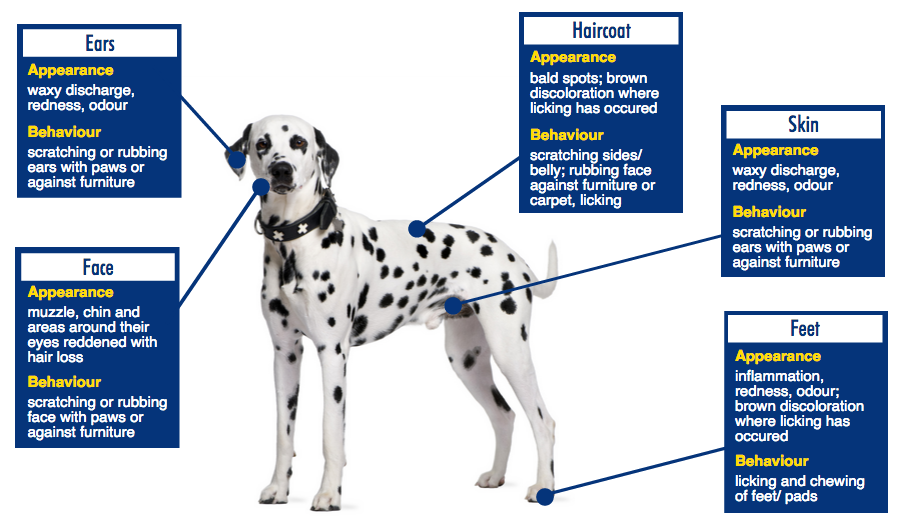Relieve the Itch with Nature’s Benadryl: Quercetin
Allergies in Dogs and Cats have become an epidemic. Veterinary clinics are being flooded with patients of allergy symptoms and nearly half of all dogs you meet have some sort of food restriction. Often times allergies are due to a particular food and once the culprit is found, a solution can just be eliminating that food from the diet. But what happens when there seems to be no particular reason for your pets red itchy skin? Or what if you had an allergy test done and found out your dog is allergic to something you cannot control like pollen or dust mites? You certainly can’t confine your dog to a sanitized bubble and not let them get outside- that would be cruel! If this situation sounds familiar, you are not alone and there is something out there that is safe and will effectively relieve your dog of his symptoms.
 CORTICOSTEROIDS AND ANTIHISTAMINES
CORTICOSTEROIDS AND ANTIHISTAMINES
 If you choose to make a trip to your veterinarian, more likely than not, you will be advised to start your dog on a round of corticosteroid medications (eg. vanectyl P, prednisone, prednisolone).
If you choose to make a trip to your veterinarian, more likely than not, you will be advised to start your dog on a round of corticosteroid medications (eg. vanectyl P, prednisone, prednisolone).
These medications will mask allergy symptoms and provide your dog relief – but at what cost? Steroids can cause increased thirst, urination, weight gain, dry hair, blood disorders and delayed healing; and these are only the immediate side effects. Long term health concerns include diabetes, Cushing’s disease, atrophy of the adrenal glands and a higher risk of infection since the body’s immune system is compromised. It is for these reasons we highly recommend avoiding these medications at all cost and trying an all natural approach first.
Antihistamines, such as Benadryl, are another, safer option that steroids for treating allergic symptoms. However, unless the symptoms are mild, antihistamines alone are unlikely to provide enough relief. This is why antihistamines are commonly prescribed in conjunction with cortisone to treat allergic symptoms.
WHAT IS QUERCETIN?

Quercetin is a flavonoid (plant pigment) commonly found in fruits and vegetables that have anti-oxidant, anti-histamine and anti-inflammatory properties. When your dog has an allergic reaction, his body releases histamines to try and rid the body of the allergen and this is what causes red, itchy skin, watery eyes, etc. Quercetin works well for allergic symptoms because it turns off histamine production and also reduces inflammation. Quercetin also helps to inhibit cellular activity responsible for inflammation which means itching is reduced. It also stops the production of certain inflammatory molecules which is helpful in treating asthma and other respiratory conditions that are associated with inflammation. Because Quercetin is a natural flavonoid found in the skin of certain fruits and veggies, it is very safe to use and has few side effects.
DOSAGE
Although quercetin can be found in fruits and veggies such as apples, grapes, dark cherries, dark berries, onions, and parsley, it is not recommended that you feed your dog these foods as many of them are toxic to pets. Instead, we recommend adding a supplement in pill or capsule form to your dog’s food. Many Quercetin supplements also contain Bromelain which is a substance that increases the bioavailability of quercetin, making it easier for the body to absorb and use. Bromelain is an enzyme that suppresses histamines, and Bromelain and Quercetin together inhibit a compound that is responsible for pain and inflammation. These two substances work together as a powerhouse, ridding the body of histamines and relieving your pet of those annoying allergy symptoms!
Dosage for pets:
- Take the weight of your pet and multiply it by 1000, then divide it by 125 to get the milligram dosage your pet needs.
- A 70lb dog for example: (70lb x 1000= 70,000 then divide by 125 = 560mg).
- The recommended dosage is 560mg per day. Round this number to the nearest whole number, in this case, the dose would be 500mg per day. Divide the dose in 2 and give morning and night.
FUN FACT
Quercetin has some anti-cancer properties! Results from a study done at Maryland Medical Centre shows that flavonoids such as Quercetin have been shown to limit cancer cell growth in breast, colon, prostate, ovarian, endometrial and lung tumors.
We all know our environment is filled with more and more toxins each day, and like us, our dogs are sensitive to these toxins. These toxins cause inflammation, and overweight pets have even more inflammation. Even worse is that everyday toxins are stored in the fat cells of overweight dogs and Cancer thrives off inflammation. During low dose chemotherapy, certain enzymes are targeted with the use of anti-inflammatory drugs to reduce blood flow to cancer cells which stops them from growing. This is the same enzyme that is partially inhibited by Quercetin!
** The suggestions given in this blog are based on the experience and knowledge of True Carnivores staff. Any of the information given does not replace the advice of a holistic veterinarian.**



 CORTICOSTEROIDS AND ANTIHISTAMINES
CORTICOSTEROIDS AND ANTIHISTAMINES